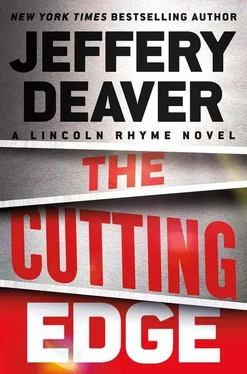“It’s the fault line. We need to search about two blocks on either side.”
Stanello sighed. “You know, we’ve got miles of pipes here. And you have to remember, we can only shut off utility-supplied natural gas. A lot of customers use propane from private companies. There’s no way to shut that off except at the tank in the home or office.”
Williams said, “I’ve told our Central Robbery people to drop everything else and start checking the paperwork. And we’ve got a bot running the nine-one-one tapes from Vinegar Hill.” He shrugged. “But unless somebody saw him in the act, I’d bet it wasn’t even called in.”
Williams asked, “When did he plant the device?”
Pulaski said, “Sometime in the past week, we think. Ten days. We aren’t sure.”
“So CCTVs won’t do much good,” Sachs said. Looking around at the hundreds of structures — all old and largely built of wood.
Sachs said, “Evacuate.”
“Evacuate what?” Stanello asked.
“Everything. Every building for two blocks on either side of that fault.”
“That’d be chaos,” Stanello said uncertainly. “There could be injuries. Elderly residents, children.”
Williams said, “And the press’ll have a field day if there is no bomb.”
“And what’ll they say if there is one and we don’t get people out?” Amelia Sachs hated to have to state the obvious.
The supervisors, Williams and Stanello, regarded each other.
The battalion chief asked, “You sure there’s a device in Vinegar Hill?”
Sachs thought: Sure? What exactly is sure?
She said, “Absolutely.” Then added a truthful component: “And he’s set one every day for the past two days. No reason to think he’ll change his pattern now. And if the prior devices’re any indication, we’re late in the day at this point. I’m thinking it’ll detonate at any time.”
A moment of silence. Then Williams said, “All right, we’ll do it. Evacuate as many as we can, check the gas lines in the basements, mark them safe and the residents can go back in.”
Stanello nodded. He lifted his radio to his lips and gave the command to his officer to start evacuating residents.
“And there’s a school here, right?” Pulaski asked.
“PS Three Oh Seven. A few blocks away.”
“Empty it,” the young officer said.
“It’s not along the center line,” Stanello said, nodding at the map on his phone.
Sachs was about to intervene but Pulaski said firmly, “It’s a school day. Evacuate it.”
Stanello paused a moment. “Okay, I’ll do it.”
Williams walked to his officers. “Everybody, into cars. Loudspeakers. Just say there’s a possible gas leak, and everybody should leave the buildings immediately. Don’t take any belongings, just leave.”
“Come on,” Sachs said to Pulaski. “We’ll start knocking on doors too.” She called to Williams and Stanello, “We’ll start south, work our way east then north.”
They piled into the Torino and sped down to York. Pulaski was looking around, his face troubled. “How many people you think live here? Where his target zone is?”
She guessed the population of Vinegar Hill was fifty thousand or so. Much less in the area around the fault but she supposed a good number. “This time of day, eight thousand.”
“How many you realistically think we can evacuate?”
Sachs’s answer was a grim laugh.
Carmella Romero often said, gravely, that she was a spy.
The fifty-eight-year-old had shared that comment with her four children and eleven grandchildren. The basis for her claim was that she worked for the government as an agent.
Though in her case, the employer wasn’t the CIA or James Bond’s Secret Service. It was the New York City Traffic Enforcement.
The stocky, gray-haired woman, a lifetime resident of Brooklyn, had decided two years ago after her last daughter had flown the nest that she was going to get a job. A fan of TV shows about police, like Blue Bloods , she thought a career in law enforcement might be nice (and Tom Selleck could be her commissioner any day!).
Being a gun-toting cop wasn’t in her future, given her age (the cutoff at NYPD is thirty-five), but there was no age limit for TEAs. Also, she was regularly furious when Mr. Prill, a neighbor, parked wherever the hell he wanted to — in front of the hydrant, on the sidewalk, in the crosswalk. And he was rude when you called him on it! Imagine. And she decided she’d had it. He and people like him weren’t going to get away with anything anymore. Carmella Romero had a sense of humor, as well, and appreciated that quality in others. She’d loved it when Traffic Enforcement put up signs: Don’t Even Think of Parking Here . How could she not want to go to work for an outfit like that?
No, she wasn’t in the Blue Bloods world of law enforcement but now she had a chance to do something a little closer to what real cops did. She and all the other TEAs (never “brownies,” don’t ever say that), as well as every city worker in this part of Brooklyn, had been enlisted to evacuate buildings and get into basements in Vinegar Hill to see if there was a little white device that looked like a thermostat attached to the gas line.
An IED!
Improvised explosive device. (She knew the phrase thanks to, ta-da, a case that Tom Selleck’s son had run; it didn’t come up much in Traffic Enforcement briefings.)
Carmella Rosina Romero was Bomb Squad Girl for a day.
The block she had been given contained three-, four- and five-story walk-ups. Like many in Brooklyn, with easy access to Manhattan, they would be packed with tenants. And the construction was old. Oh, there should have been recent renovations to bring them up to code — maybe, if the landlords were honest — but the buildings still would be tinderboxes, compared with new construction.
She was walking to the first one on her “beat,” on the corner, when she froze.
Beneath her there was a trembling.
Was that it? The fake earthquake she and the other city folks had been briefed about?
Her radio clattered, “Be advised. All those on evac duty. That was confirmed as a detonation of an IED near Cadman Plaza. Evacuation is now critical. You’ve got about ten minutes until secondary explosion and fire.”
Romero sped forward on stocky legs, feet pointed outward, to the corner building, intent on hitting the intercom and ordering the evacuation.
Flaw: No intercoms. Not even a doorbell. You apparently had to let somebody know ahead of time you were coming to call. Or maybe you just shouted your arrival.
She shouted.
No response.
Think, woman. Think, Agent! What the hell? Pulling a loose paver from the street, she smashed the glass of the door and leapt back from the falling shards. She opened the door from inside and burst into the building, calling, “Police. Gas emergency, evacuate the building!” Pounding on doors and repeating the warning.
A door in the back opened and a Latino man in T-shirt and jeans stepped out, frowning. He was, it turned out, the superintendent. She told him about the danger and, wide-eyed, he nodded, promising he’d tell the tenants.
Her radio clattered, “TEA Romero, come in. K.”
With a thumping heart — she’d never been summoned by dispatch before — she called in. “Romero here. K.”
“You’re on Front Street?”
“Affirmative. K.”
“Further to the evac, Central Robbery in Brooklyn reported a break-in a week ago. Eight Oh Four Front. Somebody in hard hat and safety vest was seen using a bolt cutter to get through the basement window. Nothing was missing. That’s the profile of the suspect. We think he might’ve put the device in there.”
Читать дальше







![Джеффри Дивер - Where the Evidence Lies [A Lincoln Rhyme Short Story]](/books/403782/dzheffri-diver-where-the-evidence-lies-a-lincoln-r-thumb.webp)




